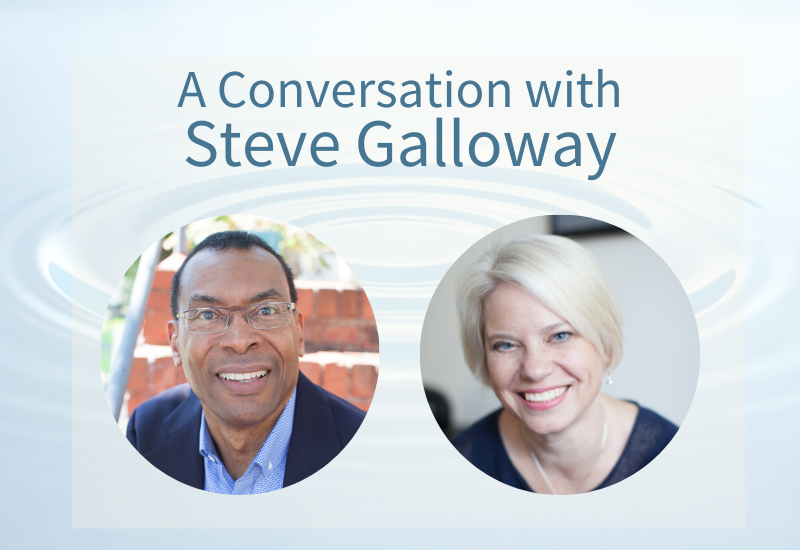Subscribe to Nebo's Reflections

Listen to this Blog
This month, Nebo Founder Kate Ebner interviewed Nebo coach and pioneering DEI educator Steve Galloway, following up on a talk that Steve presented to the Georgetown University Institute for Transformational Leadership Network in early 2023. Steve has worked with organizational cultures for more than two decades. An organization development specialist and co-founder of ChoicePoints Learning, Steve has helped many people find the pathway to learning about themselves and others in the context of race.
Kate: Steve, you have been doing this work for many years. What do you wish people knew about race in the workplace?
Steve: “I would like people to know that the context within which we all live and work shapes our experiences. Though all working in the same organization, the impressions, stereotypes, opportunities for development, evaluation, and overall working experiences are often very different and potentially detrimental for Black employees. In the workplace, race matters.”
Kate: Can you speak to this experience from the perspective of a leadership coach, Steve?
Steve: “Many of my Black friends, colleagues, and clients have shared common experiences ranging from being ignored, avoided, confronted with microaggressions, stereotyped, receiving inequitable performance ratings, lack of developmental opportunities, suppressing their personal values, views, and identity to fit in with the organizational culture to feelings of depression, and many more. Though many of these issues can be experienced by white clients as well, the reality of historic, systemic, and institutionalized racism and discrimination has created a very different contextual experience for Blacks in the workplace. As such, how the individual is coached can be influenced by the awareness of such difference. Coaching should not be colorblind.”
Kate: What can leadership coaches do to help leaders make these connections and engage in learning more about Black experience at work?
Steve: It all begins with self-awareness. Coaches can help leaders recognize how their own racial identity, attitudes, and beliefs impact their perspectives and actions with their Black staff. In addition to doing their own work, coaches and leaders can begin learning more about the contrast between the Black and white work experience via various resources, followed by skill development opportunities that would enable them to engage in conversation about race, without fear or apprehension. I’m asking both coaches and leaders to do their homework and take responsibility for their learning in this area.
“As across other aspects of our lives, conversations about the dynamics of race in the workplace are not going away. Since the movement for racial reconciliation ignited by the murder of George Floyd there has been a big change in how people are engaged in these conversations and more readily bringing up the impact of racial inequities and injustice on their lives. As such, there is an expectation that leaders and coaches not only have the awareness of these challenges faced by Black employees, but also the courage and competencies to help them effectively develop and leverage their strengths to overcome those challenges.”
–Steve Galloway
Kate: Steve, what do you think this homework could include?
Steve: Great question! Each person must find their own starting point, but here are some ideas to work with:
- Get to know someone who is racially different from you. How many of you have a Black friend? Do you have a Black colleague? Do you have a Black doctor or dentist? Have you taken time to get to know this person and learn about their life experiences, particularly as a person of color? Developing a reciprocal, authentic relationship with another human being of a different race from you naturally opens up the conversation and more importantly, builds a respectful and trusting connection.
- Stay tuned in. What are some of the topics being discussed out there about race? What’s hot? Are you following current events and considering them through the lens of diverse experiences? Become knowledgeable about resources and tap into a range of ways to learn and stay abreast of new material. Keep your eyes and ears open for opportunities to learn; even from others you may not have considered.
- Move beyond the reading to having real conversations about race. Reading and watching videos can open your eyes and provide important background information, but it’s not enough. Having a conversation takes knowledge out of the abstract and makes it real for everyone. If you are choosing to do the work, you must get into a conversation with others where you can put your thoughts into language and hear what others are thinking and feeling about race.
- Get back on the bike. When you were learning to ride a bike, you fell. What got you back on the bike after falling and bruising your knee? You wanted to ride. If you want to learn about the dynamics of race, you can expect to have some bumps and bruises along the way. You must have an internal mindset to want to learn. Ask yourself: why is it important for me as a leadership coach, colleague, or friend to do this? Learn how to be part of the conversation.
Kate: Steve, you have offered tangible ways that we can “get on the bike.” I notice that many of us struggle to find and use the language needed for a conversation about race. It can be uncomfortable. What if someone is afraid of making a mistake?
Steve: “As coaches and leaders, we are human beings, too. In our culture, we have been socialized not to talk about race, not to see difference. We carry that baggage into the conversation when you sit across the table from someone who is racially different and quite naturally don’t know what to say. Being comfortable is not always the best condition for learning. The only way to address the challenges associated with racism and forms of injustice in the workplace is to be open to experiencing discomfort in an honest, open, and sincere way. Give yourself a little grace and mercy. Accept that you are never going to be perfect. Apologize and admit your mistakes, be grateful for the feedback, listen to those who have been hurt, acknowledge and accept their truth, and commit to doing better. Then pick yourself up and get back on the bike.”.
Kate: Sometimes people ask me whether it is important for people to have a coach who shares the same race as the leader being coached. How would you answer that, Steve?
Steve: “Sharing similar racial backgrounds can help the client feel more comfortable and safer to open up in the conversation. Some clients may feel a coach of the same race “gets them or knows where they are coming from.” This shared connection and commonality may often lead to higher levels of trust more quickly. However, a shared racial background may not offer the range of differing points of view or alternative actions that the client may need to move forward in their development.
Cross-race matches may offer the differing perspectives that will challenge the client to explore alternative ways of seeing, doing, and being that can be beneficial to their growth. The coach may also benefit from exposure to another’s perspective and lived-experience. On the other hand, cross racial matches may be ineffective due to the inability of both the coach and client to overcome any assumptions, stereotypes, or other limiting beliefs that will not enable the respectful trusting relationship required.
In my experience, effective cross-race coaching matches, like those of same-race matches, are founded on mutual respect, valuing and appreciating each other. That said, I strongly believe the greater the level of awareness and understanding of the differences experienced by Black employees, the higher their likelihood of achieving more successful coaching outcomes.”
Kate: Steve, thank you for sharing your thoughts with us. Your encouragement to our community to engage in learning and doing the work is a clarion call to action and personal responsibility. Is there anything else you’d like to say?
Steve: “I am a lifelong optimist. I believe that we are all on a journey of learning together. As a coach, having a basis and understanding of the context of the world in which Black Americans live and work gives you a leg up when those opportunities to talk about race arise. Coaches need to get more comfortable asking the question that opens the door to a conversation about how race may be a factor in that leader’s experience. It may be the key to helping someone reach their desired outcome and be their best selves.
As leadership coaches, we are called to make a positive difference in the lives of ALL of those we come in contact with. Let’s stand together in the knowing that we can be the change we want to see in the world.”
Resources:
Share









